百校联盟高三4月教育教学质量监测考试(全国Ⅰ卷) 英语含答案
- 格式:doc
- 大小:1.69 MB
- 文档页数:17
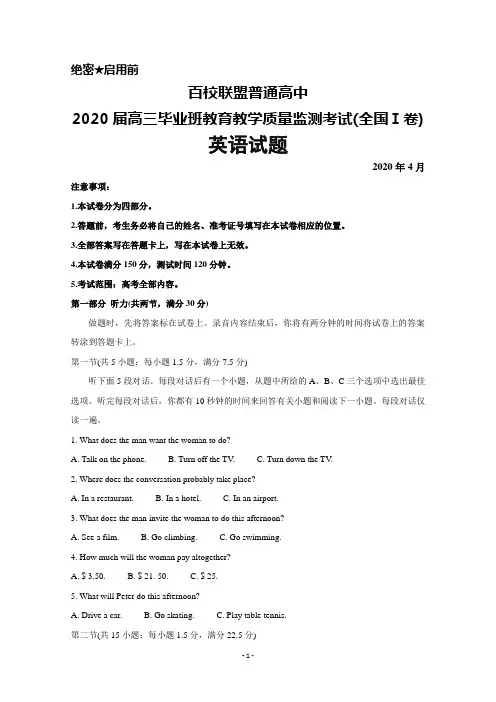
绝密★启用前百校联盟普通高中2020届高三毕业班教育教学质量监测考试(全国Ⅰ卷)英语试题2020年4月注意事项:1.本试卷分为四部分。
2.答题前,考生务必将自己的姓名、准考证号填写在本试卷相应的位置。
3.全部答案写在答题卡上,写在本试卷上无效。
4.本试卷满分150分,测试时间120分钟。
5.考试范围:高考全部内容。
第一部分听力(共两节,满分30分)做题时,先将答案标在试卷上。
录音内容结束后,你将有两分钟的时间将试卷上的答案转涂到答题卡上。
第一节(共5小题;每小题1.5分,满分7.5分)听下面5段对话。
每段对话后有一个小题,从题中所给的A、B、C三个选项中选出最佳选项。
听完每段对话后,你都有10秒钟的时间来回答有关小题和阅读下一小题。
每段对话仅读一遍。
1. What does the man want the woman to do?A. Talk on the phone.B. Turn off the TV.C. Turn down the TV.2. Where does the conversation probably take place?A. In a restaurant.B. In a hotel.C. In an airport.3. What does the man invite the woman to do this afternoon?A. See a film.B. Go climbing.C. Go swimming.4. How much will the woman pay altogether?A. $ 3.50.B. $ 21. 50.C. $ 25.5. What will Peter do this afternoon?A. Drive a car.B. Go skating.C. Play table tennis.第二节(共15小题;每小题1.5分,满分22.5分)听下面5段对话或独白。
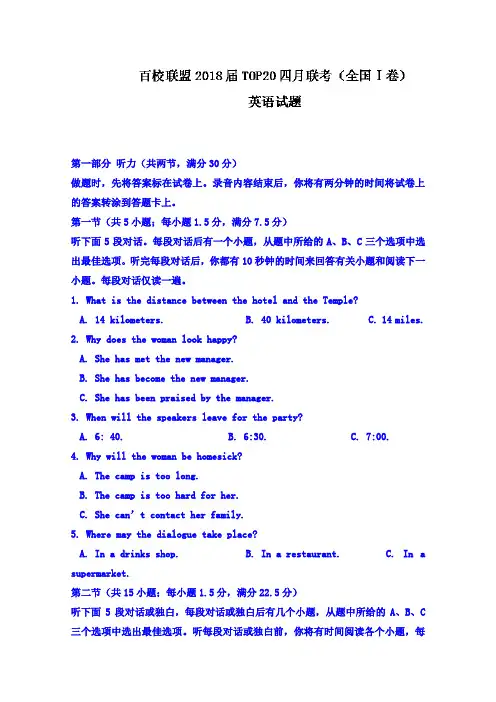
第一部分听力(共两节,满分30分)做题时,先将答案标在试卷上。
录音内容结束后,你将有两分钟的时间将试卷上的答案转涂到答题卡上。
第一节(共5小题;每小题1.5分,满分7.5分)听下面5段对话。
每段对话后有一个小题,从题中所给的A、B、C三个选项中选出最佳选项。
听完每段对话后,你都有10秒钟的时间来回答有关小题和阅读下一小题。
每段对话仅读一遍。
1. What is the distance between the hotel and the Temple?A. 14 kilometers.B. 40 kilometers.C. 14 miles.2. Why does the woman look happy?A. She has met the new manager.B. She has become the new manager.C. She has been praised by the manager.3. When will the speakers leave for the party?A. 6: 40.B. 6:30.C. 7:00.4. Why will the woman be homesick?A. The camp is too long.B. The camp is too hard for her.C. She can’t contact her family.5. Where may the dialogue take place?A. In a drinks shop.B. In a restaurant.C. In a supermarket.第二节(共15小题;每小题1.5分,满分22.5分)听下面5段对话或独白,每段对话或独白后有几个小题,从题中所给的A、B、C 三个选项中选出最佳选项。
听每段对话或独白前,你将有时间阅读各个小题,每小题5秒钟;听完后,各小题将给出5秒钟的作答时间。
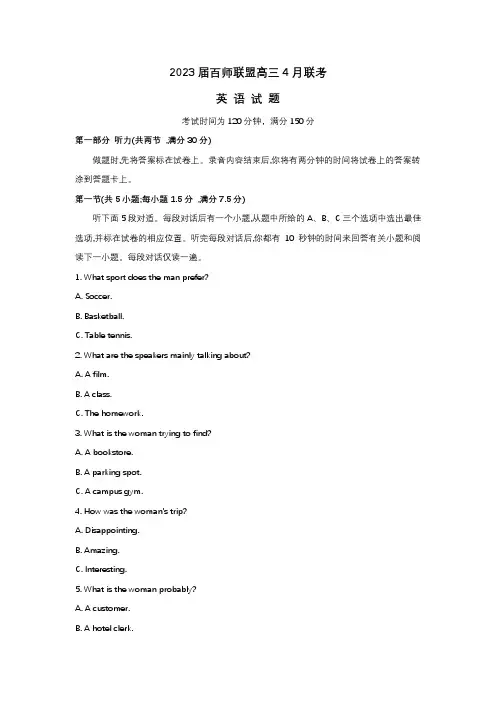
2023届百师联盟高三4月联考英语试题考试时间为120分钟,满分150分第一部分听力(共两节,满分30分)做题时,先将答案标在试卷上。
录音内容结束后,你将有两分钟的时间将试卷上的答案转涂到答题卡上。
第一节(共5小题;每小题1.5分,满分7.5分)听下面5段对适。
每段对话后有一个小题,从题中所给的A、B、C三个选项中选出最佳选项,并标在试卷的相应位置。
听完每段对话后,你都有10秒钟的时间来回答有关小题和阅读下一小题。
每段对话仅读一遍。
1. What sport does the man prefer?A. Soccer.B. Basketball.C. Table tennis.2. What are the speakers mainly talking about?A. A film.B. A class.C. The homework.3. What is the woman trying to find?A. A bookstore.B. A parking spot.C. A campus gym.4. How was the woman's trip?A. Disappointing.B. Amazing.C. Interesting.5. What is the woman probably?A. A customer.B. A hotel clerk.C. A shop assistant.第二节(共15小题;每小题1.5分,满分22.5分)听下面5段对话或独白。
每段对话或独白后有几个小题,从题中所给的A、B、C三个选项中选出最佳选项。
听每段对话或独白前,你将有时间阅读各个小题,每小题5秒钟;听完后,各小题将给出5秒钟的作答时间。
每段对话或独白读两遍。
听第6段材料,回答第6、7题。
6. What will the speakers do tonight?A. Watch a film.B. Enjoy a concert.C. See a play.7. When will the speakers meet?A. At7:30.B. At 7:00.C. At 6:30.听第7段材料,回答第8、9题。
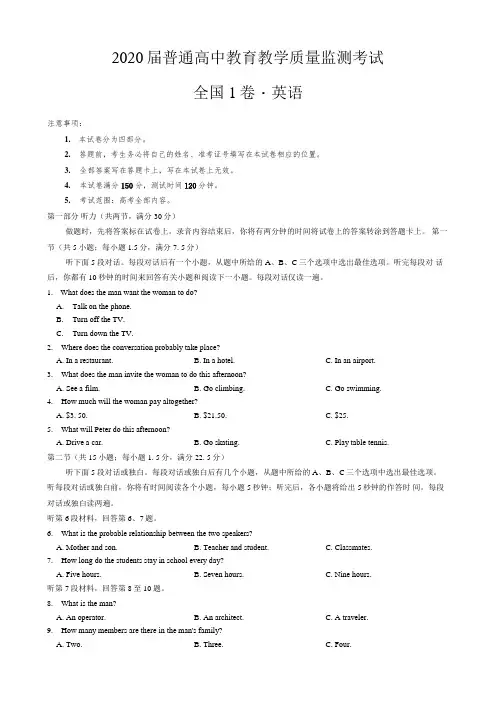
2020届普通高中教育教学质量监测考试全国1卷・英语注意事项:1.本试卷分为四部分。
2.答题前,考生务必将自己的姓名、准考证号填写在本试卷相应的位置。
3.全部答案写在答题卡上,写在本试卷上无效。
4.本试卷满分150分,测试时间120分钟。
5.考试范围:高考全部内容。
第一部分听力(共两节,满分30分)做题时,先将答案标在试卷上。
录音内容结束后,你将有两分钟的时间将试卷上的答案转涂到答题卡上。
第一节(共5小题;每小题1.5分,满分7. 5分)听下面5段对话。
每段对话后有一个小题,从题中所给的A、B、C三个选项中选出最佳选项。
听完每段对话后,你都有10秒钟的时间来回答有关小题和阅读下一小题。
每段对话仅读一遍。
1.What does the man want the woman to do?A.Talk on the phone.B.Turn off the TV.C.Turn down the TV.2.Where does the conversation probably take place?A. In a restaurant.B. In a hotel.C. In an airport.3.What does the man invite the woman to do this afternoon?A. See a film.B. Go climbing.C. Go swimming.4.How much will the woman pay altogether?A. $3. 50.B. $21.50.C. $25.5.What will Peter do this afternoon?A. Drive a car.B. Go skating.C. Play table tennis.第二节(共15小题;每小题1. 5分,满分22. 5分)听下面5段对话或独白。
每段对话或独白后有几个小题,从题中所给的A、B、C三个选项中选出最佳选项。
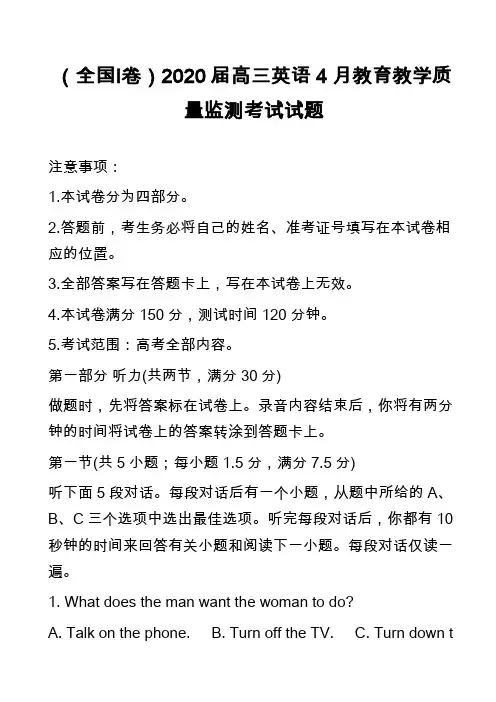
(全国Ⅰ卷)2020届高三英语4月教育教学质量监测考试试题注意事项:1.本试卷分为四部分。
2.答题前,考生务必将自己的姓名、准考证号填写在本试卷相应的位置。
3.全部答案写在答题卡上,写在本试卷上无效。
4.本试卷满分150分,测试时间120分钟。
5.考试范围:高考全部内容。
第一部分听力(共两节,满分30分)做题时,先将答案标在试卷上。
录音内容结束后,你将有两分钟的时间将试卷上的答案转涂到答题卡上。
第一节(共5小题;每小题1.5分,满分7.5分)听下面5段对话。
每段对话后有一个小题,从题中所给的A、B、C三个选项中选出最佳选项。
听完每段对话后,你都有10秒钟的时间来回答有关小题和阅读下一小题。
每段对话仅读一遍。
1. What does the man want the woman to do?A. Talk on the phone.B. Turn off the TV.C. Turn down the TV.2. Where does the conversation probably take place?A. In a restaurant.B. In a hotel.C. In an airport.3. What does the man invite the woman to do this afternoon?A. See a film.B. Go climbing.C. Go swimming.4. How much will the woman pay altogether?A. $ 3.50.B. $ 21. 50.C. $ 25.5. What will Peter do this afternoon?A. Drive a car.B. Go skating.C. Play table tennis.第二节(共15小题;每小题1.5分,满分22.5分)听下面5段对话或独白。
每段对话或独白后有几个小题,从题中所给的A、B、C三个选项中选出最佳选项。
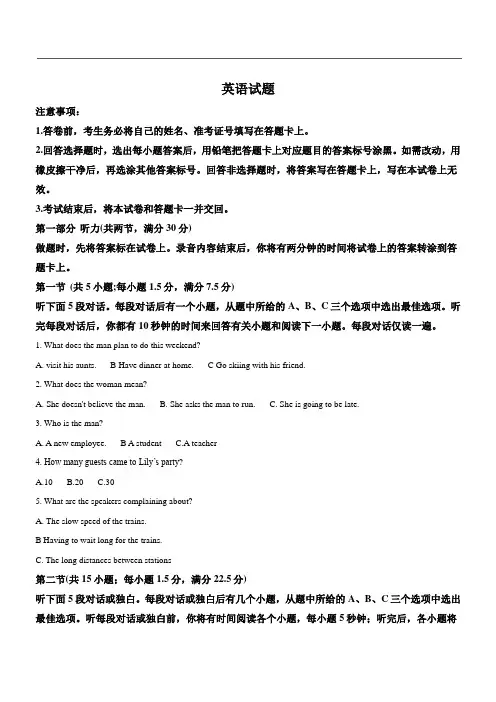
英语试题注意事项:1.答卷前,考生务必将自己的姓名、准考证号填写在答题卡上。
2.回答选择题时,选出每小题答案后,用铅笔把答题卡上对应题目的答案标号涂黑。
如需改动,用橡皮擦干净后,再选涂其他答案标号。
回答非选择题时,将答案写在答题卡上,写在本试卷上无效。
3.考试结束后,将本试卷和答题卡一并交回。
第一部分听力(共两节,满分30分)做题时,先将答案标在试卷上。
录音内容结束后,你将有两分钟的时间将试卷上的答案转涂到答题卡上。
第一节(共5小题;每小题1.5分,满分7.5分)听下面5段对话。
每段对话后有一个小题,从题中所给的A、B、C三个选项中选出最佳选项。
听完每段对话后,你都有10秒钟的时间来回答有关小题和阅读下一小题。
每段对话仅读一遍。
1. What does the man plan to do this weekend?A. visit his aunts. B Have dinner at home. C Go skiing with his friend.2. What does the woman mean?A. She doesn't believe the man.B. She asks the man to run.C. She is going to be late.3. Who is the man?A. A new employee. B A student C.A teacher4. How many guests came to Lily’s party?A.10B.20C.305. What are the speakers complaining about?A. The slow speed of the trains.B Having to wait long for the trains.C. The long distances between stations第二节(共15小题;每小题1.5分,满分22.5分)听下面5段对话或独白。

2020届河南省百校联盟高三4月教学质量检测:英语试卷第一部分(共20小题每,小题1.5分,满分30分)1.Everybody was touched ______ words after they heard her moving story.A.without B.beyondC.against D.despite2.--- The manager of the factory wants to improve production a great deal, but he doesn’t spend much on technology.---I am afraid he won’t realize his dream. You know ________.A.you can’t eat your cake and have it B.empty vessels make the greatest soundC.enough is as good as a feast D.two heads are better than one3.Top graduates from universities are ________ by major companies.A.chased B.registeredC.offered D.compromised4.China's Beidou Navigation Satellite System has started providing global services, ________ to become complete around 2020.A.being scheduled B.scheduled C.to schedule D.scheduling5.— Nancy, what classes are you taking this term?— _____ I want to take two English courses, or maybe Spanish.A.What’s up? B.It’s none of your business. C.I’ve no idea. D.I’m not sure yet.6.When faced with a big challenge ________ potential failure seems to hide at every corner, maybe you've heard this advice before: “Be more confident.”A.where B.whose C.which D.of which7.Philips won 8 gold medals at the Beijing Olympic Games, __________astonished the world.A.that B.which C.what D.who8.You _____ read a book in the sun—it'll do harm to your eyes.A.couldn't B.wouldn't C.needn't D.mustn't9.—Why not buy a second-hand car first if you don’t have enough money for a new one?—That’s a good ________.A.saying B.questionC.account D.suggestion10.It wasn’t until then _______ their marriage was breaking up because they had little in common.A. did I realizeB. that I realizedC. had I realizeD. when I realized11.What the country did _____ the international trade regulations, for which it was widely condemned. A.approved B.violated C.bothered D.interrupted12.It is not only blind men who make such stupid mistakes. People who can see sometimes act__________. A.just foolishly B.less foolishly C.as foolishly D.so foolishly13.People expect Shanghai Disneyland Park to offer better service than ________ of Tokyo’s.A.this B.it C.one D.that14.The infrastructure project has consumed so much money that we can't find any financial support and have to ______.A.pull out B.pull throughC.catch up D.catch on15.He would be in better health now _______ with too much work when young.A.had he not burdened himself B.if he was not burdenedC.were he not burdened D.had he not been burdened himself16.Nowadays, more and more young ladies, figures most are fine enough, are going on a diet. A.who B.whoseC.of whose D.of whom17.He finished writing his first novel last year, and we all think that is ______ his career really took off. A.where B.whenC.how D.why18.Is this your cell phone, Tony? I ________ it when I was cleaning the classroom.A.came across B.dealt withC.looked after D.held on to19.The teacher came into the classroom _______ by his students.A.following B.to be following C.followed D.having followed.20.There are many famous cultural relics in our country, many _______ thousands of years ago. A.dating back to B.date back toC.dated back to D.were dated back to第二部分阅读理解(满分40分)阅读下列短文,从每题所给的A、B、C、D四个选项中,选出最佳选项。
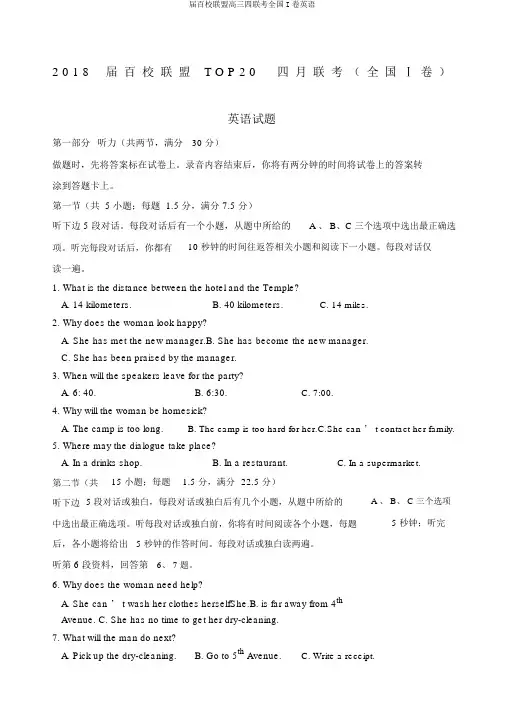
2 0 1 8届百校联盟T O P 2 0四月联考(全国Ⅰ 卷)英语试题第一部分听力(共两节,满分30 分)做题时,先将答案标在试卷上。
录音内容结束后,你将有两分钟的时间将试卷上的答案转涂到答题卡上。
第一节(共 5 小题;每题 1.5 分,满分 7.5 分)听下边 5 段对话。
每段对话后有一个小题,从题中所给的 A 、 B、C 三个选项中选出最正确选项。
听完每段对话后,你都有10 秒钟的时间往返答相关小题和阅读下一小题。
每段对话仅读一遍。
1. What is the distance between the hotel and the Temple?A. 14 kilometers.B. 40 kilometers.C. 14 miles.2.Why does the woman look happy?A. She has met the new manager.B. She has become the new manager.C. She has been praised by the manager.3.When will the speakers leave for the party?A. 6: 40.B. 6:30.C. 7:00.4. Why will the woman be homesick?A. The camp is too long.B. The camp is too hard for her.C.She can ’ t contact her family.5. Where may the dialogue take place?A. In a drinks shop.B. In a restaurant.C. In a supermarket.第二节(共15 小题;每题 1.5 分,满分22.5 分)听下边 5 段对话或独白,每段对话或独白后有几个小题,从题中所给的 A 、 B、 C 三个选项中选出最正确选项。
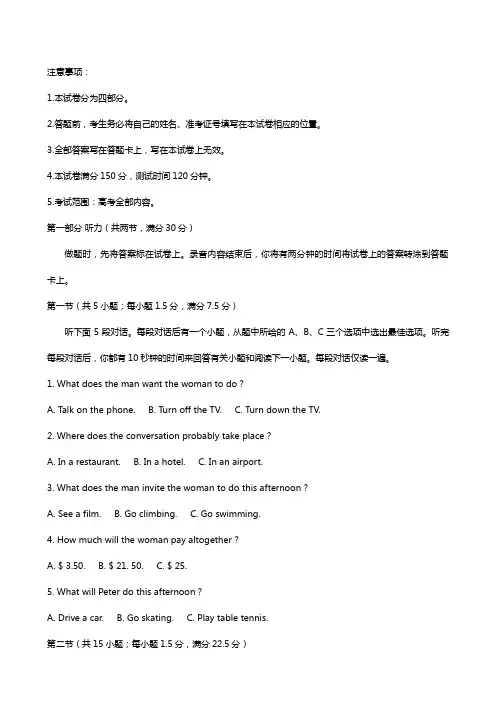
注意事项:1.本试卷分为四部分。
2.答题前,考生务必将自己的姓名、准考证号填写在本试卷相应的位置。
3.全部答案写在答题卡上,写在本试卷上无效。
4.本试卷满分150分,测试时间120分钟。
5.考试范围:高考全部内容。
第一部分听力(共两节,满分30分)做题时,先将答案标在试卷上。
录音内容结束后,你将有两分钟的时间将试卷上的答案转涂到答题卡上。
第一节(共5小题;每小题1.5分,满分7.5分)听下面5段对话。
每段对话后有一个小题,从题中所给的A、B、C三个选项中选出最佳选项。
听完每段对话后,你都有10秒钟的时间来回答有关小题和阅读下一小题。
每段对话仅读一遍。
1. What does the man want the woman to do?A. T alk on the phone.B. Turn off the TV.C. Turn down the TV.2. Where does the conversation probably take place?A. In a restaurant.B. In a hotel.C. In an airport.3. What does the man invite the woman to do this afternoon?A. See a film.B. Go climbing.C. Go swimming.4. How much will the woman pay altogether?A. $ 3.50.B. $ 21. 50.C. $ 25.5. What will Peter do this afternoon?A. Drive a car.B. Go skating.C. Play table tennis.第二节(共15小题;每小题1.5分,满分22.5分)听下面5段对话或独白。
每段对话或独白后有几个小题,从题中所给的A、B、C三个选项中选出最佳选项。
百校联盟2020届普通高中教育教学质量监测考试全国I卷·英语注意事项:1.本试卷分为四部分。
2.答题前,考生务必将自己的姓名、准考证号填写在本试卷相应的位置。
3.全部答案写在答题卡上,写在本试卷上无效。
4.本试卷满分150分,测试时间120分钟。
5.考试范围:高考全部内容。
第一部分听力(共两节,满分30分)做题时,先将答案标在试卷上。
录音内容结束后,你将有两分钟的时间将试卷上的答案转涂到答题卡上。
第一节(共5小题;每小题1.5分,满分7.5分)听下面5段对话。
每段对话后有一个小题,从题中所给的A、B、C三个选项中选出最佳选项。
听完每段对话后,你都有10秒钟的时间来回答有关小题和阅读下一小题。
每段对话仅读一遍。
1. What does the man want the woman to do?A. Talk on the phone.B. Turn off the TV.C. Turn down the TV.2. Where does the conversation probably take place?A. In a restaurant.B. In a hotel.C. In an airport.3. What does the man invite the woman to do this afternoon?A. See a film.B. Go climbing.C. Go swimming.4. How much will the woman pay altogether?A. $ 3.50.B. $ 21. 50.C. $ 25.5. What will Peter do this afternoon?A. Drive a car.B. Go skating.C. Play table tennis.第二节(共15小题;每小题1.5分,满分22.5分)听下面5段对话或独白。
每段对话或独白后有几个小题,从题中所给的A、B、C三个选项中选出最佳选项。
听每段对话或独白前,你将有时间阅读各个小题,每小题5秒钟;听完后,各小题将给出5秒钟的作答时间。
每段对话或独白读两遍。
听第6段材料,回答第6、7题。
6. What is the probable relationship between the two speakers?A. Mother and son.B. Teacher and student.C. Classmates.7. How long do the students stay in school every day?A. Five hours.B. Seven hours.C. Nine hours.听第7段材料,回答第8至10题。
8. What is the man?A. An operator.B. An architect.C. A traveler.9. How many members are there in the man's family?A. Two.B. Three.C. Four.10. On what condition will the man accept the job?A. The working environment is very good.B. He doesn't have to work in Washington, DC.C. The company pays for a return ticket and the salary is good.听第8段材料,回答第11至13题。
11. Where did the woman find the wallet?A. In a shop.B. In a parking lot.C. Near her home.12. What can be found in the wallet?A. Sixteen dollars.B. An ID card.C. Some money and a business card.13. How will the woman get in touch with the owner of the wallet?A. Call the owner.B. Ask her father for help.C. Wait where she found the wallet. 听第9段材料,回答第14至17题。
14. When did the woman's grandmother pass away?A. Yesterday.B. Two days ago.C. Three days ago.15. Where did the woman's grandmother pass away?A. At home.B. In a hospital.C. On a trip.16. What was the woman doing when her grandmother passed away?A. Working.B. Sleeping.C. Traveling.17. What does the man invite the woman to do?A. To take a photo.B. To have dinner.C. To do some exercise.听第10段材料,回答第18至20题。
18. What do the people have in common in the community?A. History and interests.B. History and diets.C. Diets and interests.19. When was the American Indian Society of Washington, DC founded?A. In August 1966.B. In August 1956.C. In October 1966.20. What helps the organization keep its members up-to-date on the Society's activities?A. A monthly e-mail.B. A weekly meeting.C. A monthly newspaper.第二部分阅读理解(共两节,满分40分)第一节(共15小题;每小题2分,满分30分)阅读下列短文,从每题所给的A、B、C和D四个选项中,选出最佳选项。
AMany people have made a positive contribution to the world. These inspiring men and women have made a positive contribution in different fields-including science, literature, politics, human rights and art.Moses (1391 BC-1271 BC) was a key figure in Jewish history, who led theJewish people from slavery in Egypt across the Red Sea to the promised land.He gave important teachings of the Old Testament/Torah.Confucius (551 BC-479 BC), a Chinese philosopher, is one of the mostinfluential men in the history of China, who laid the groundwork for much ofChinese philosophy and society.Socrates(469 BC-399 BC)showed the importance of personal courage andindependent thought. His philosophic method of self-inquiry provided the basisfor Western philosophy.Jesus Christ (5 BC-30 AD), Spiritual Teacher and inspiration of Christianity. Hetaught a message of love, forgiveness and faith.William Shakespeare's(1564-16161 plays and poetry got the richness anddiversity of human existence in a powerful and poetic way, which has enrichedour culture.Joan of Arc(1412-1431)inspired the French to unite against the occupation of theEnglish. Joan of Arc showed that even a young girl from a poor background caninfluence the world.Francis Bacon(1561-1626),English philosopher, statesman and scientist. Baconis considered an important figure in the Scientific Revolution. He introduced theconcept of scientific method and methodical scientific inquiry which relied ondata and evidence.James Watt(1736-1819), Scottish engineer. Watt improved the Newcomen steamengine, creating an efficient steam engine, which was essential for the industrialrevolution.21. What contribution did Moses make?A. He first found the people of the Jewish.B. He settled down on the Red Sea with his people.C. He helped Jewish people live a better life.D. He founded a famous educational organization.22. Which of the following persons lived in the same age?A. Confucius and Socrates.B. Jesus Christ and Socrates.C. Joan of Arc and James Watt.D. William Shakespeare and Francis Bacon.23. What made William Shakespeare so famous?A. His outstanding plays and poetry.B. His philosophic method of self-inquiry.C. His influence on the history of England.D. His courage got from a poor family.BThe other day, my parents stopped by and dropped off a birthday gift to me. After the visit I watched my parents walking down my front steps toward their car. My father took my mother by the arm and slowly and carefully helped her step down the small steps, which hit me really hard. It has been happening slowly over the years. Because my own life has been going through so much change (my kids have grown up and moved out over these years), I had somehow simply failed to notice just how much my own parents were aging.As a child we see our dads as these big strong men who work hard,protect us, and just take care of things. We see our moms as our caretakers who are always there to make sure our needs are attended to so we always know we are loved. All through my growing up they looked the same to me.That is how they have always seemed to me. Now I see a little gray haired mom who is fragile and breakable, and I see a gray haired father who walks a little slower than he once did.The thought made me break into tears. And I realize I need to spend more time with my parents.I need to make sure I get their advice now on the things I should know for the future so I don't waste my chance to get it while they are still both here with me. I need to ask them to tell me more stories about their own life and all the lessons they have learned. Let's all make an effort to make more time for them and make sure they feel appreciated while we still have them with us.24. Why did the author refer to her parents' visit?A. Her parents bought a special gift for her.B. She was longing for her parents' coming.C. She overlooked her parents getting old.D. Her parents seldom came to her house.25. What can we infer from the first paragraph?A. The author has raised her kids on her own.B. The author hardly pays a visit to her parents.C. The author has a poor relationship with her kids.D. The author felt guilty while watching her parents.26. What does the author want to do in the future?A. To get more attention from her parents.B. To devote more time to her parents.C. To listen to her parents' advice carefully.D. To get a caretaker to attend her parents.27. Which is the proper title for the passage?A. Aging Is Really a Fact We Have to AcceptB. Learn More from Parents While They Are ClearC. Love Your Parents Before They Get Too OldD. Accompany Your Parents Before It's Too LateCChina is developing a system that recognizes individuals by their body shape and walking movements. Systems that recognize human faces are already being used to identify people in crowds or as a secure way to unlock personal devices.The new system, known as "gait recognition", is already on trial by police on the streets of Beijing and Shanghai. The Chinese technology company Watrix developed the system. The company announced last month that it had raised$14. 5 million to speed up the development and sale of thetechnology.The system works in a similar way to face recognition. Cameras capture video of people in public places. Then, machines powered by artificial intelligence (AI) examine and study the video.Facial recognition systems identify the shapes and expressions on a person's face to identify them. Gait recognition uses a person's body shape and their way of walking to identify them. The system records a person's shape and movements and then creates a model of the way they walk.Huang Yongzhen is a former researcher who co-founded Watrix in 2016. He told the Associated Press his system can identify people from up to 50 meters away. It is designed to work even when a person's face is covered or hidden. Huang says his gait recognition system is correct 94 percent of the time. This is below the success rate of many face recognition systems. But he says the system can still be helpful to police and for other commercial purposes. He also believes the system can be effective when used together with face recognition.Gait recognition is not new. The technology has been researched by scientists in Japan and Britain and by U. S. defense officials for about 10 years. But attempts to sell the technology have been slow. One of the reasons the technology has not developed' further is that the systems are more complex than facial recognition.28. What can we learn from the first paragraph?A. A system that can recognize human faces is around the corner.B. It is tough to accurately follow a person in crowds.C. A system that can identify a person by walking is being developed.D. A new system that can check a body shape is under way.29. What do you know about Watrix mentioned in the passage?A. It has invented a lot of systems adopted by the police.B. It has earned $ 14.5 million by inventing the system.C. It has become famous for the face recognition system.D. It has got well prepared for the new system.30. Facial recognition is similar to gait recognition because .A. cameras catch video of people's expressionsB. a person's body shape can be recognized very easilyC. cameras record video of a person in public placesD. a person's action will be sent to the police31. What can be inferred from the last paragraph?A. Japan and Britain kept a secret about the system.B. The systems of gait recognition are hard to develop.C. Gait recognition will suffer a poor market very soon.D. Almost no one understands how gait recognition runs.DOn Wednesday V olvo said it will use cameras fixed inside its vehicles to monitor drivers' behavior. Volvo's in-car cameras will monitor eye movements to gauge drivers' distraction. If a driver looks away for a period of time, such as at a smartphone, a representative from V olvo's on-call assistance centers will call them to check in. Drivers who aren't watching the road, or even have their eyes closed, will be warned as well. If they don't respond, the car will slow down and even stop. The system will be applied to all V olvo cars by early 2020.This follows V olvo's recent announcement that it will be limiting the top speed on all of its vehicles to 180 km/h(112 mph) in a bid to reduce traffic accidents. Over the years, the company built its reputation on safety and designs."When it comes to safety, our aim is to avoid accidents altogether rather than limit the effect when an accident is unavoidable," Henrik Green, senior vice president for research and development at V olvo Car Group, said in a statement. "In this case, cameras will monitor behavior that may lead to serious injury or death.”The camera tracks the driver's eye movements, allowing for a "hands-free" driving experience. If the driver's attention wanders, Super Cruise uses a series of warnings to ensure the driver keeps their eyes on the road.As cameras are in the name of safety, there's a real chance they can be misused to invade privacy. Automakers are already collecting lots of information from your car today, but mostly for vehicle analytics. GM(通用汽车公司)has said that the camera in its Cadillac cars isn't recording anything.Volvo didn't respond to questions about access to the vehicle's camera, but in a statement clarified that the exact technical setup of the camera has yet to be decided.32. What's the meaning of the underlined word "gauge" in the first paragraph?A. Warn.B. Judge.C. Indicate.D. Predict.33. What will happen if the program is carried out?A. The V olvo cars will be sold at a higher price.B. The Volvo cars will meet with no accidents.C. The Volvo cars will largely promote sales.D. The V olvo cars will see fewer accidents.34. What can we learn according to Henrik Green?A. The in-car cameras will ensure the drivers' safety.B. In fact a number of accidents are unavoidable.C. The in-car cameras are designed to prevent accidents.D. Volvo Car Group will do research on the accidents.35. What can be inferred from the passage?A. Volvo is the first car:-maker to use in-car cameras.B. Some people hold negative opinions on such cameras.C. GM thinks fixing in-car cameras is their patent.D. Volvo has no chance to spy on people's privacy.第二节(共5小题;每小题2分,满分10分)根据短文内容,从短文后的选项中选出能填入空白处的最佳选项。